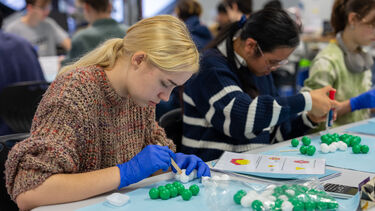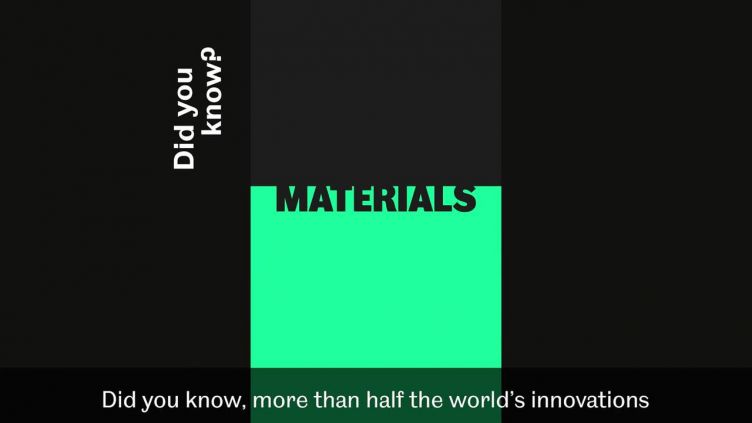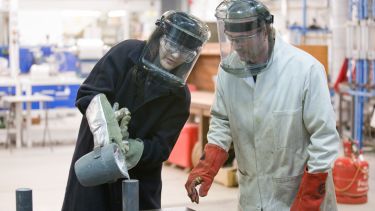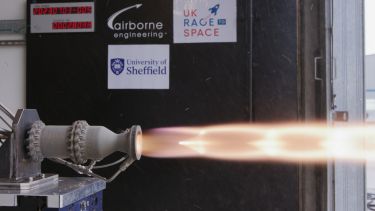Studying Materials Science and Engineering
What is Materials Science and Engineering, and what is it like to study it? This page explores student life, the exciting projects you’ll take on, and the supportive community at Sheffield. Find out if it’s the right place to start your engineering journey.

What is Materials Science and Engineering?
Have you ever wondered what makes a smartphone screen so durable, how a plane can fly, or how we might build a greener future? The answer lies in the incredible world of Materials Science and Engineering.
From the metal in aircraft engines to the polymers in medical devices and the ceramics used in space exploration, materials scientists and engineers design, test and develop the building blocks of modern life. They combine physics, chemistry, and engineering to create materials that are stronger, lighter, more sustainable, and more efficient.
Materials science engineer discover new materials with amazing properties, and they understand how existing materials behave and why. They also design and create new materials to solve real-world problems, and develop ways to make materials more efficiently and sustainably.
At the University of Sheffield, you’ll join a community that's shaping the future of clean energy, sustainable manufacturing, and next-generation technologies. Our researchers are helping to design materials for fusion reactors, create biodegradable plastics, and transform the way industries think about recycling and sustainability.
A degree in Materials Science and Engineering opens doors across a huge range of sectors — aerospace, automotive, healthcare, energy, and beyond. Whether you're passionate about tackling climate change, building better medical tech, or designing the materials of the future, this could be the path for you.
Materials Science and Engineering undergraduate courses
95% of our gradate are in employment or further studies
1st in teaching on my course for material science in the UK
National Student Survey (NSS) 2025
1st in the UK for student voice for materials technology
National Student Survey (NSS) 2025
3rd in the UK for material science and engineering (general engineering category)
The Complete University Guide 2026
4th in the UK for materials technology
The Times and The Sunday Times Good University Guide 2025
5th in the UK for material science and engineering (general engineering category)
The Guardian University Guide 2025
Our facilities
You will have access to state-of-the-art facilities when you join us. Much of the equipment you will use is the same as you will find in industry. These are some of the main labs you will use as an undergraduate student.
The Quarrell Lab in the Sir Robert Hadfield Building
We have our own foundry which you will get to use as part of your undergraduate degree. Practical sessions in the Quarrell Lab include aluminium casting and glass melting. These are hands-on practical sessions where you learn how to perform sand casting with aluminium and the processes involved in glass melting and annealing of samples to achieve the desired mechanical and optical properties.
Materials Lab in the Diamond
In the Materials Lab, you will have the opportunity to learn about many types of materials, how they work and how their structures can be controlled. The lab houses equipment for analysing and testing a variety of material properties.
Thermodynamics Lab in the Diamond
With the requirement for improved energy efficiency becoming an increasingly key component of modern engineering, this lab offers the opportunity to investigate all aspects of this process.
Bioengineering Labs in the Diamond
The Bioengineering Bacterial Lab is equipped with the latest biomanufacturing technologies used in the pharmaceutical and bioscience industry. The lab offers industry-relevant facilities enabling the design, production and improvement of bioproducts, such as antibodies, enzymes, growth factors and vaccine antigens, used in the treatment of cancer, immune disorders, infections and disease. The use of material for biological purposes – from catheter tubes to utilising titanium to aid ligament repair – requires a strong understanding of how such materials react with the human body. The Bioengineering-Tissue Lab has the capacity to test these boundaries and teach vocational bioengineering skills using high specification equipment.
These are just a few of the cutting-edge labs housed within The Diamond. You’ll also find specialist spaces like the Clean Room and the Fluids Lab, offering even more opportunities to get hands-on with advanced equipment and real-world applications. Explore the full range of labs in The Diamond and discover where your learning could take you.
Learning and Teaching
In the first two years of your course you will gain a thorough grounding in the fundamentals of materials science and engineering and begin to build your interdisciplinary skills with projects across the entirety of the faculty of Engineering! You will be introduced to a wide variety of courses spanning mechanical and functional material properties and their origins as well as the processing and sustainability of materials.
Your learning will encompass everything from formal lectures, to small class tutorial sessions, lab work, group projects and presentations, culminating in the second year Artefacts projects - a fun rethinking of materials beyond just their function. Building on your fundamental knowledge from Years 1 & 2 allows you to target your specialist modules more meaningfully in later years and tailor your degree to your future career goals.
The industrially focussed MEng course is heavily guided by our industrial advisory board and includes industrially linked group projects, working on actual industrial challenges.
Regardless of whether you choose the MEng or BEng streams, your degree concludes with an individual final year research project during which you will lead your own research, allowing you to develop your skills and apply your technical knowledge, addressing a problem of your choosing and contributing to our improved understanding of materials science. We offer a wide range of final year projects for our students to choose from. This means that you can pick something that you are both interested in and is relevant to helping you develop skills for your future.
Societies and student led activities
Engineering students have the opportunity to take part in competitions and other practical activities to hone their skills in preparation for their careers. Below are just a few of the teams and societies that you can be a part of at Sheffield.
MatSoc
MatSoc is the student society for Materials Science and Engineering students. The aim is to create a welcoming and friendly environment for everyone. The committee does this by running fun socials, leading two sports teams, organising academic trips and the Annual Ball to celebrate the department.
“I was on MatSoc for three years and I can honestly say that it was some of the best times I’ve had at uni. Getting to meet so many amazing people, putting together events and seeing everyone enjoying themselves is really rewarding. If I could I would go back and do it all again in a heartbeat.” Matt - President 2021-22
“MatSoc has played a special part in my time at university. I met some of my best friends at the Bloo88 freshers social, who have been incredible and super supportive. It’s been great to be involved and organise the trip to the Nuclear AMRC and participate in STEM outreach volunteering.” Catie - President 2022-23
Sunride
Sunride is the University of Sheffield’s student-led rocketry team, designing and building record-breaking high-powered rockets. The team recently made UK history by successfully testing SunFire — the first 3D-printed, liquid-fuelled rocket engine built by students, and the most powerful of its kind. Their ultimate mission? To become the first UK student team to launch a rocket beyond the Kármán line into space.
iForge
The iForge, located in the award winning Diamond building, is the UK’s first student led makerspace in a university giving all engineering students the opportunity to collaborate, create and make outside of academic studies. The iForge is run by student reps who train and supervise other student users, as well as procuring and maintaining equipment, developing links with alumni and industry, and running special events.
Industry Links
Our Industrial Advisory Board provides a link between your studies and the professional world, ensuring we teach you the skills in demand from industry. For example, you’ll be using industry standard equipment – making, testing and characterising different materials in our bespoke labs or benefit from links when looking for a placement.
Over many years, we have developed close relationships with businesses across a broad range of industry sectors. Therefore you'll have the opportunity to explore opportunities in pretty much any sector that interests you, through visits, placements and project work.
How to apply
You can apply for an undergraduate course at Sheffield via UCAS (the Universities and Colleges Admissions Service): How to apply
Stay in touch
To stay up to date with all things Material Science and Engineering at Sheffield, you can find us on Instagram, X, Facebook, and LinkedIn.
If you have any questions about studying Material Science and Engineering at Sheffield?
Visit our Contact page for prospective students to get in touch – we're here to help!

International undergraduate scholarships
We are offering scholarships of £2,500 for each year (subject to a 60% average) of your undergraduate degree. The maximum value is £10,000 for four-year programmes.







